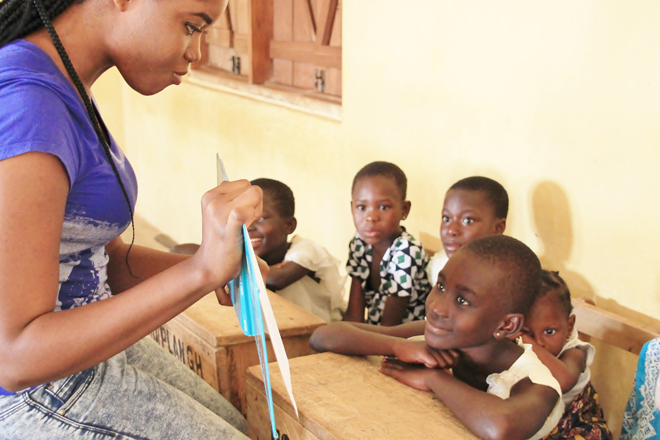
Keep every child safe
Young people in Ghana have appealed to government , parents and society to take steps to end all forms of violence against them in order to keep every child safe from harm.
Advertisement
The children made the appeal the ‘Youth Talks’ programme
Young advocates and children at the ceremony shared had the opportunity to share their experiences on violence in and around schools as well as online.
Although corporal punishment has been banned by the Ghana Education Service (GES), children at the event confirmed that in reality, teachers were still applying harsh discipline.
The youth’s appeal to end violence confirms the results of a poll of an SMS based platform known as U-Report which indicated that 54
A youth advocate, Miss Abigail Mamle Teye, said the advocacy against corporal punishment was not about “sparing the rod and spoiling the child” but for teachers to encourage and motivate rather than using force and harsh punishment
The Director of the Guidance and Counselling Unit of the GES,
She said although the GES banned corporal punishment in February last year, she recently witnessed a teacher beat a child because she did not bring an exercise book to school
She said teachers know the developmental stages of adolescents and, therefore, are in the best position to apply the right kind of discipline and not be violent.
A Form Three pupil of a basic school in Accra, Deborah, recounted an experience where a student tried to commit suicide because she had been verbally abused by a teacher.
She noted that sometimes when a pupil makes a mistake in class, it became his or her tag name and that could prevent the victims from attending school.
Deborah appealed to both teachers and parents to stop verbal abuse adding that “our parents insult us not knowing the effect it has on us. Please counsel us but do not insult us when we go wrong.”
For her part, Miss Stella Darley Tetteh, a youth advocate said she was subjected to violence as a child.
Although she did not mention the form of violence she was subjected to, she appealed the GES to incorporate gender-based violence into
Speaking on bullying in schools, Ernest and Benedicta, also from a basic school in Accra called on young people to stop bullying others because of the harmful effects on many stressing that people who bullied others should be punished and the victims
On online safety, Kenneth and Roland from a basic school in
They also called on regulatory bodies to check adverts on alcohol and sexual enhancement products since they were not good for children.
The Communication Manager of UNICEF Ghana, Eulette Ewart, congratulated the young people who participated
She said young people are powerful agents of change and UNICEF believes that youth participation adds value.
However, she noted that many children are affected by psychological, physical and sexual violence and this can harm a child or adult for many years.
Earlier in her introductory remarks, the Communication Officer for Adolescent and Youth Engagement, UNICEF Ghana,
She said it was important to hear the voices of children and young people on issues that
She said recommendations of such programmes would be used to develop the UNICEF global’s youth manifesto to remind member states of their commitment to
The Acting Director of the Department of Children,
The programme was interspersed with videos and moderated by MzVee, a musician, and Francisca Forson, a broadcaster.




